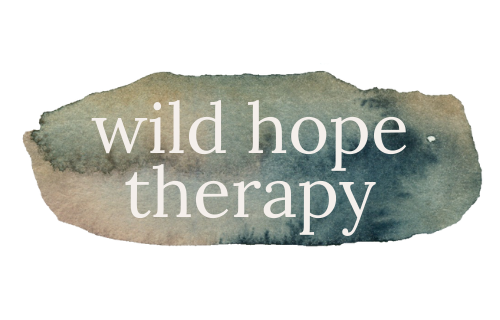why "fit" matters in therapy
If you have a consultation with any Wild Hope Therapy provider, they will reiterate again and again the importance of “fit” between therapist and client. Our values as a practice include being accessible and authentic in our work with our clients for this reason. Study after study after study has shown that the most predictive factor in a positive outcome from therapy is a strong therapeutic alliance. In other words, the better the relationship and connection you have with your therapist, the more effective therapy will be. We want to make sure that we are able to develop a real relationship with our clients because that is what is most predictive of real change for you.
While therapeutic alliance is the primary predictive factor of success, it’s important to know what goes into a successful relationship with a clinician, or what makes a “good fit.” Back when I was first starting in private practice I came across this article that I thought was helpful for anyone searching for a therapist, whether for the first time or the 100th time. Some of my favorite tips from this piece include: treating your consultation like a first date (chemistry matters!) and looking for affordable options (talking about money is hard for everyone, but a good therapist should lay out your options for you to make an informed decision.) I wanted to add a few of my own tips for this process:
Take your time and interview as many clinicians as you need to feel confident. I work with a lot of clients on assertiveness, so what better first step than hiring (yes, hiring!) the best person for a job that only you can define.
Check out their website and social media presence. Not all practices have these things, but if they do this is a low stakes, low anxiety way to get a sense if the clinician’s approach and values are in line with your own.
Be clear on their treatment approach and that it is the right one for you. While the relationship is more predictive than the approach, you still should make sure that the clinician you're meeting with has the tools in their toolbox that you hope to use. If you want a trauma-informed, social justice-based approach, the clinician you’re consulting with should be able to speak to that. Really wanted to try EMDR? Ensure this therapist can provide that specific therapy and is properly trained.
Ask what experience the therapist has with concerns similar to yours. I don’t always have experience with the exact concern my clients present with, but I’m always willing to admit that, share relevant experience, and explain how I would educate myself to properly support them. A good clinician will also admit when they are NOT comfortable or equipped to treat a certain concern.
Don’t know what you’re looking for or how to assess “fit?” Just feeling nervous or anxious about your first time with therapy? You can say that, too. A therapist who is going to be able to attune to your needs and communication style throughout your work together should be able to guide an initial conversation that helps you both feel comfortable moving forward working together.
Every therapist at Wild Hope is prepared and eager to have these conversations with new clients. The importance of this process is why we offer a free consultation. Therapy is all about learning how to make choices in life that we can feel proud of. A great start to that journey will begin with allowing yourself the time, information, and space to decide who to partner with along the way.
